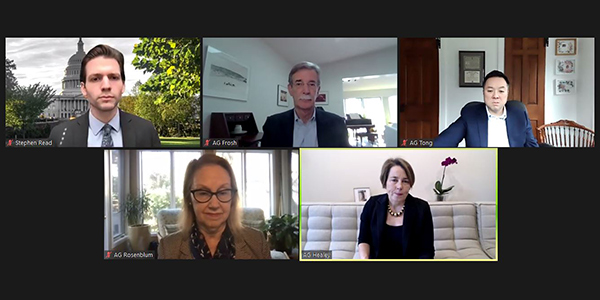New York University’s State Energy and Environmental Impact Center released a new report on Thursday that recounts actions that state attorneys general took to mitigate the Trump administration’s weakening of regulations on energy, climate and the environment.
The report details measures by state AGs on clean energy, environmental justice and addressing per- and polyfluoroalkyl substance (PFAS) contamination. It also focuses on maneuvers in federal agency rulemaking processes and in court that prevented the administration from cementing its climate and energy policies and reversing regulatory protections for air, waters, wildlife, public lands and public health.
‘Strong Defense’
According to the report, state AGs worked together to prevent political appointees to EPA and the departments of Energy and the Interior from freely shunning rulemakings, delaying compliance deadlines and ignoring statutory directives from Congress.
“Putting up a strong defense has always been the focus of our work during this reckless administration,” Massachusetts AG Maura Healey said.
The AGs said they worked to uphold obligations to address power sector carbon emissions and keep auto emissions reductions on track. They sought to prevent unlimited methane emissions from the oil and gas industry and defeat the Department of Energy’s push for a bailout of the coal industry.
“The Trump administration has spent the last four years doing the bidding of the fossil fuel industry, from rolling back limits on greenhouse gas emissions that undermine clean car standards to opening up protected areas to oil and gas drilling,” Healey said.
Oregon AG Ellen Rosenblum said that when the Trump administration took aim at California’s carbon cap-and-trade market with Quebec in 2019 with a lawsuit, her state joined more than a dozen others to defend the agreement. The Department of Justice alleged that California’s voluntary agreement with Quebec violated two rarely invoked constitutional provisions, the Treaty and Compact Clauses. In two opinions in March and July 2020, a federal district court rejected DOJ’s claims, noting that the California-Quebec agreement did not represent a “treaty” within the Constitution, nor did it rise to the level of a “compact.”
“The court saw right through the administration’s claims and rejected them outright,” Rosenblum said.
Maryland AG Brian Frosh said the Trump administration’s “zeal to prop up the fossil fuel industry caused them to embark upon a climate destruction program.”
“They refused to enforce and attempted to overturn dozens of rules that protect our climate and, not incidentally, our air and water,” Frosh said. The administration “tried to lift pollution caps on cars, trucks, industries, utilities, landfills [and] oil drilling. They have overridden the findings of scientists; they’ve ignored the opinions of experts.”
‘Collective Action’
In 2018, Connecticut AG William Tong and New York AG Letitia James sued EPA for its failure to meet its obligations under the Clean Air Act’s “Good Neighbor” provision, which requires action against upwind pollution sources that prevent downwind states from meeting required air quality standards under the National Ambient Air Quality Standards.
“Unfortunately, under the Trump administration, we’ve seen an aggressive, systematic effort to dismantle these basic protections,” Tong said.
The suit successfully found that EPA missed its deadline to promulgate federal plans to address upwind pollution and ordered the agency to do so by early December 2018.
When EPA responded with a rule that fell short of its CAA obligations, state AGs took the agency to the D.C. Circuit Court of Appeals and won. Tong, Healey and three other state AGs sued EPA again for dragging its feet and won again in July 2020, as the court cited the agency for its “failure to take immediate action.” The court gave EPA a March deadline to promulgate plans to reduce ozone emissions from upwind states. The AGs said the final rule will help protect millions of residents of downwind states from exposure to smog and other pollutants that cause asthma, lung damage and other respiratory harms.
Tong said the state AGs actions are “vindicated by core constitutional principles.”
“The environment, and our collective action on the environment and protecting the climate is in large part why we have a federal government because the federal government is there to help us accomplish the things as states that we cannot effectively do by ourselves,” Tong said.




